Federal Reserve Bank Note
Federal Reserve Bank Notes, issued 1915-34, are banknotes that are legal tender in the United States, together with United States Notes, silver certificates, Gold Certificates, National Bank Notes and Federal Reserve Notes.[1] They had the same value as other kinds of notes of similar face value. Federal Reserve Bank Notes differ from Federal Reserve Notes in that they are backed by one of the twelve Federal Reserve Banks, rather than by all collectively. They were backed in a similar way to National Bank Notes, using U.S. bonds, but issued by Federal Reserve banks instead of by chartered National banks. Federal Reserve Bank Notes are no longer issued; the only U.S. banknotes still in production since 1971 are the Federal Reserve Notes.
Large size Federal Reserve Bank Notes were first issued in 1915 in denominations of $5, $10, and $20, using a design that shared elements with both the National Bank Notes and the Federal Reserve Notes of the time. Additional denominations of $1, $2, and $50 were issued in 1918.
Small size Federal Reserve Bank Notes were printed as an emergency issue in 1933 using the same paper stock as National Bank Notes. They were printed in denominations of $5 through $100. A National Bank Note has a line for the national bank's president's signature. The small size Federal Reserve Bank Note printed a bar over the label for this line since Federal Reserve Banks had governors, not presidents.[2] The wording also was changed to add, "Or by like deposit of other securities" after the phrase, "Secured by United States bonds deposited with the Treasurer of the United States of America".[3] The twelve Federal Reserve Districts also appear on the bills as black alphabetically sequenced letters, from "A" to "L", a system essentially followed today on the $1 and $2 bills.
This emergency issue was prompted by the public hoarding of cash because of the many bank failures happening at the time. This also limited the ability of the National Banks to issue notes of their own. Small size Federal Reserve Bank Notes were discontinued in 1934 and no longer available from banks since 1945.[2] As small size notes, they have brown seals and serial numbers, as do National Bank Notes of the era. But while they look very similar, and both say "National Currency" across the top of the obverse, the issuers were not the same and they are considered to be distinctly different types of bills.
Complete denomination type set of Federal Reserve Bank Notes
Large-size notes
| Large-size Federal Reserve Bank Notes: Series 1915/1918 | |||||||||||
|---|---|---|---|---|---|---|---|---|---|---|---|
| Image | Value | Dimensions | Main Color | Description | |||||||
| Obverse/Reverse | Obverse | Reverse | |||||||||
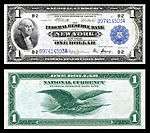 |
$1 | Large-size note 7.375 x 3.125 inches (187 x 79 mm) |
Green; Black | George Washington | Eagle with flag. | ||||||
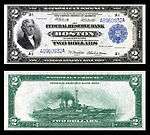 |
$2 | Large-size note 7.375 x 3.125 inches (187 x 79 mm) |
Green; Black | Thomas Jefferson | Battleship. | ||||||
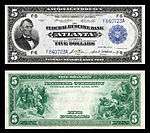 |
$5 | Large-size note 7.375 x 3.125 inches (187 x 79 mm) |
Green; Black | Abraham Lincoln | Columbus in sight of land; landing of the pilgrims | ||||||
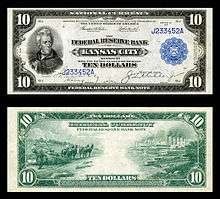 |
$10 | Large-size note 7.375 x 3.125 inches (187 x 79 mm) |
Green; Black | Andrew Jackson | Industry vignettes (farm and factory) | ||||||
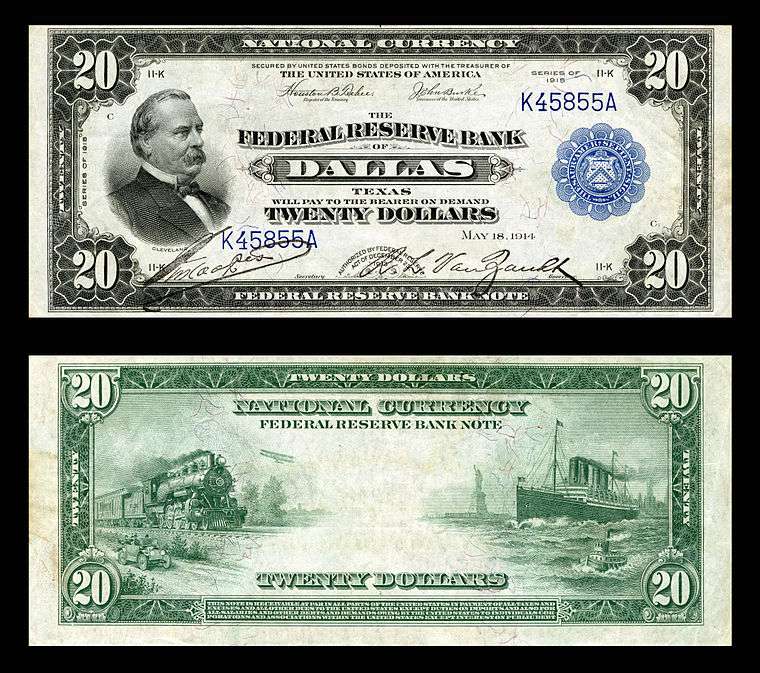 |
$20 | Large-size note 7.375 x 3.125 inches (187 x 79 mm) |
Green; Black | Grover Cleveland | Transportation vignettes (land, sea, and air) | ||||||
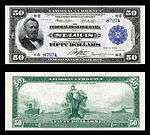 |
$50 | Large-size note 7.375 x 3.125 inches (187 x 79 mm) |
Green; Black | Ulysses S. Grant | Panama between two ships | ||||||
.jpg) |
$100 | Large-size proof 7.375 x 3.125 inches (187 x 79 mm) |
Green; Black | Benjamin Franklin | None, this denomination was never issued (proof only) | ||||||
Small-size notes
| Small-size Federal Reserve Bank Notes: Series 1929 | |||||||||||
|---|---|---|---|---|---|---|---|---|---|---|---|
| Image | Value | Dimensions | Main Color | Description | |||||||
| Obverse/Reverse | Obverse | Reverse | |||||||||
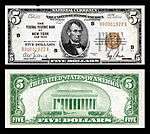 |
$5 | Small-size note 6.125 x 2.625 inches (156 x 67 mm) |
Green; Black | Abraham Lincoln | Lincoln Memorial | ||||||
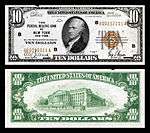 |
$10 | Small-size note 6.125 x 2.625 inches (156 x 67 mm) |
Green; Black | Alexander Hamilton | US Treasury Building | ||||||
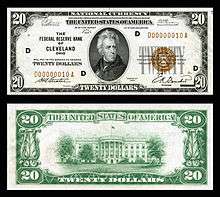 |
$20 | Small-size note 6.125 x 2.625 inches (156 x 67 mm) |
Green; Black | Andrew Jackson | The White House | ||||||
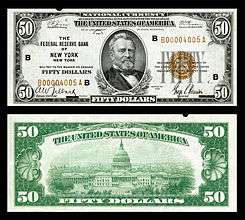 |
$50 | Small-size note 6.125 x 2.625 inches (156 x 67 mm) |
Green; Black | Ulysses S. Grant | US Capitol Building | ||||||
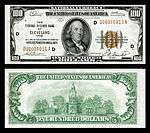 |
$100 | Small-size note 6.125 x 2.625 inches (156 x 67 mm) |
Green; Black | Benjamin Franklin | Independence Hall | ||||||
References
- ↑ "Legal Tender Status". Retrieved 3 September 2015.
- 1 2 "Six Kinds of United States Paper Currency". Retrieved 3 September 2015.
- ↑ "USPaperMoney.Info: History of Currency Designs". Retrieved 3 September 2015.
